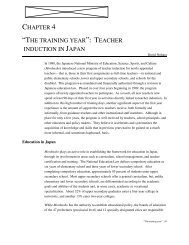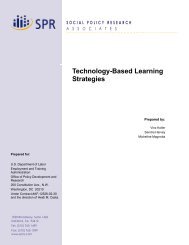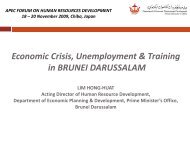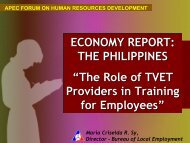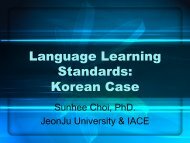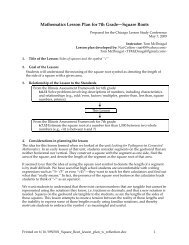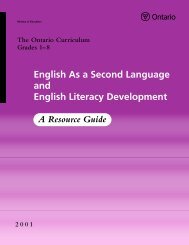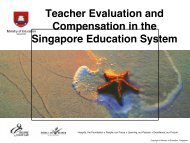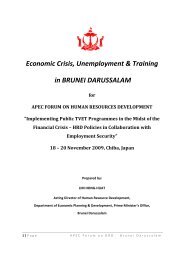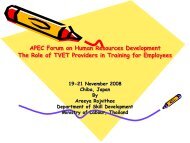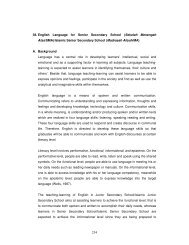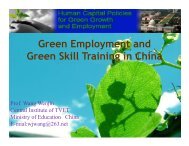Quality Assurance Systems in Asia-Pacific Economic Cooperation
Quality Assurance Systems in Asia-Pacific Economic Cooperation
Quality Assurance Systems in Asia-Pacific Economic Cooperation
You also want an ePaper? Increase the reach of your titles
YUMPU automatically turns print PDFs into web optimized ePapers that Google loves.
ENHANCEMENT OF QUALITY ASSURANCE SYSTEMS IN HIGHER EDUCATION IN APEC MEMBER ECONOMIES<br />
11. QA of Import<br />
The type of import <strong>in</strong> the APEC economies is mostly through partnership, tw<strong>in</strong>n<strong>in</strong>g and<br />
articulation arrangements. Foreign university campuses operate <strong>in</strong> Australia, Ch<strong>in</strong>a, Malaysia,<br />
Russia, S<strong>in</strong>gapore, South Korea, and Vietnam. Some amount of purely onl<strong>in</strong>e and distance<br />
education has also been reported although those operations are difficult to monitor.<br />
In Brunei, import of higher education is regulated by BDNAC. The foreign provider has to<br />
comply with the rules and regulations of BDNAC and must have a local partner.<br />
In Chile, QA of imported education depends on the type of provision. Professional degrees<br />
are highly regulated, especially <strong>in</strong> those fields where a valid degree is necessary (medic<strong>in</strong>e,<br />
teach<strong>in</strong>g, architecture, account<strong>in</strong>g, law, etc.). In these cases, the <strong>in</strong>stitutions offer<strong>in</strong>g them<br />
must be licensed <strong>in</strong> Chile, and have to undergo a strict and lengthy licens<strong>in</strong>g process (which<br />
takes between 6 and 11 years of close supervision). Graduate degrees or degrees offered <strong>in</strong><br />
non-professional fields (such as design, the arts, sciences and humanities, or other similar<br />
areas) are not regulated, and may be offered under any of the arrangements mentioned<br />
above. All HEIs seek<strong>in</strong>g to operate <strong>in</strong> the Chilean economy must be established follow<strong>in</strong>g the<br />
same rules, whether they are national or foreign. The Department of International<br />
<strong>Cooperation</strong> and Exchanges of M<strong>in</strong>istry of Education regulates imports <strong>in</strong> Ch<strong>in</strong>a.<br />
In Hong Kong the non-local courses are regulated by the Registrar of the Hong Kong Special<br />
Adm<strong>in</strong>istrative Region Government. The Education and Manpower Bureau of the government<br />
has a legislation to regulate non-local courses. Assessment of the registrability of non-local<br />
courses is <strong>in</strong> accordance with the Non-local Higher & Professional Education (Regulation)<br />
Ord<strong>in</strong>ance. There is a code of practice for non-local courses rather than accreditation.<br />
The Directorate General of HE of M<strong>in</strong>istry of National Education on behalf of the M<strong>in</strong>ister of<br />
NE has the regulatory power <strong>in</strong> Indonesia. Foreign providers have to meet all the standards of<br />
the national accreditation system.<br />
MoE has the regulatory power <strong>in</strong> Malaysia. The regulations are same as for locals but foreign<br />
programs need not comply with the MQA. Imported programs are assessed for equivalence.<br />
Branch campuses that have atta<strong>in</strong>ed self accreditation are exempted from program evaluation<br />
but are subject to an audit of <strong>in</strong>stitutional arrangements for course delivery.<br />
Any foreign provider can operate <strong>in</strong> New Zealand. However, the term university is protected<br />
by law. The provider must set up as a Private Tra<strong>in</strong><strong>in</strong>g Establishment and meet NZQA's<br />
quality assurance requirements if it: wishes to access student component fund<strong>in</strong>g and wishes<br />
students to be eligible for student loans, or enrols <strong>in</strong>ternational students (except if courses are<br />
less than three months and are exempted), or it wishes to grant degree and degree related<br />
awards, or it wishes to provide courses that have been approved by NZQA.<br />
Council for Higher Education (CHED) is the designated body to regulate <strong>in</strong> Philipp<strong>in</strong>es and<br />
the CHED Order is still be<strong>in</strong>g worked on.<br />
Federal Service of Supervision <strong>in</strong> Education and Science regulates <strong>in</strong> Russia. Regulations<br />
and expectations are the same such as quality of facilities, staff and resources.<br />
S<strong>in</strong>gapore does not regulate tw<strong>in</strong>n<strong>in</strong>g and articulation arrangements. The MoE regulates the<br />
establishment of foreign university campuses. Multiple agencies (MoE, EDB, SPRING) share<br />
the responsibility for QA arrangements. Accreditation under SQC-PEO (optional) is<br />
implemented by SPRING and CASETrust for Education, while a Student Protection Scheme,<br />
for providers that admit foreign students is under CASE.<br />
In Ch<strong>in</strong>ese Taipei, Government has the regulatory power and imports have to comply with<br />
relevant regulations such as Private School Law. In Vietnam, the M<strong>in</strong>istry of Education and<br />
Tra<strong>in</strong><strong>in</strong>g regulates imports.<br />
Hong Kong, Malaysia, New Zealand, Russia, S<strong>in</strong>gapore, Ch<strong>in</strong>ese Taipei and Australia make<br />
the <strong>in</strong>formation on regulations available on web site. In addition to web site <strong>in</strong>formation, they<br />
39



